With a $200,043 grant from FRAXA Research Foundation, Dr. Elizabeth Berry-Kravis completed a successful Phase 2 clinical trial of a PDE4 inhibitor for adult men with Fragile X syndrome. This trial treated 30 males, 18-45 years of age with a new PDE4D allosteric inhibitor from Tetra Discovery Partners using a crossover design, so that everyone got active drug for part of the time and placebo for part of the time.
Read more2018 Grants
Recruiting: Clinical Study of Non-Invasive EEG for Children Ages 2-7
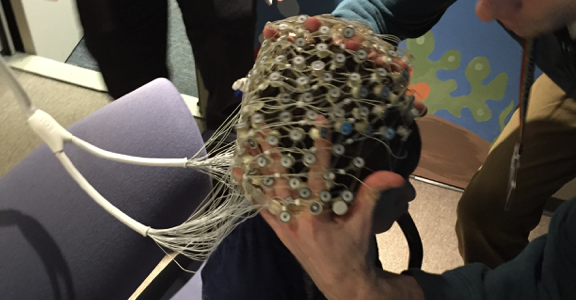
Dr. Carol Wilkinson, MD PhD, and Dr. Charles Nelson, PhD, at Boston Children’s Hospital are recruiting children ages 2-7 years with Fragile X syndrome to participate in a study of brain differences using non-invasive EEG.
Read moreCorrecting Fragile X Syndrome Deficits by Targeting Neonatal PKCε Signaling in the Brain
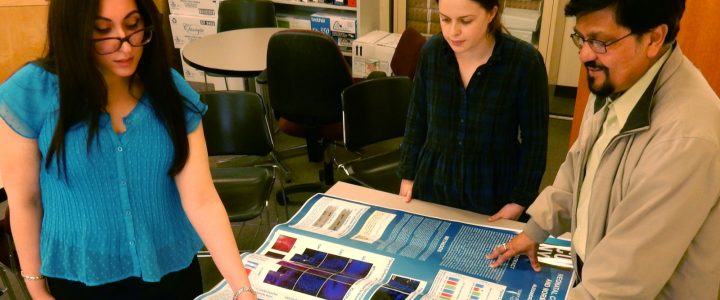
With this $90,000 grant from 2017-2018, Dr. Banerjee’s team has shown that enhancing PKCε can correct brain development and abnormal behaviors in Fragile X knockout mice and had their findings published in PubMed.
Read moreFRAXA Drug Validation Initiative (FRAXA-DVI)

The FRAXA Drug Validation Initiative (FRAXA-DVI) provides speedy, cost-effective, objective preclinical testing of potential Fragile X treatments. FRAXA-DVI uses in-vitro systems, behavior batteries, and gene expression and peripheral biomarker platforms to validate investigational new drugs and repurposed available compounds in Fragile X syndrome (FXS).
Read moreAuditory Dysfunction in Fragile X Syndrome in a Mouse Model of Fragile X
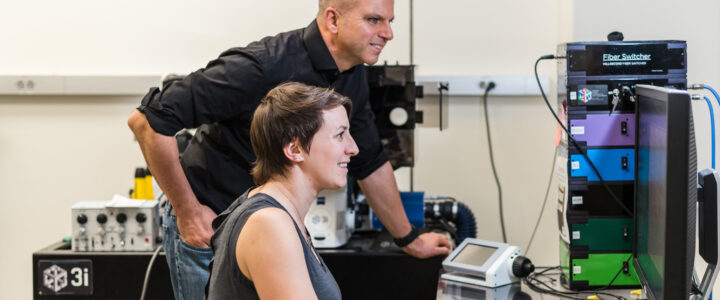
With a $90,000 grant from FRAXA, Dr. McCullagh and Dr. Achem Klug at the University of Colorado investigated whether auditory neural circuits are altered in Fragile X mice. They saw minor differences in these mice compared to B6 (control) mice in several measures of auditory acuity. Fmr1 mice had increased latency to the startle response for almost all conditions compared to B6 mice, suggesting altered timing to acoustic cues. These experiments show that, consistent with patient reports and anatomical/physiological data, the auditory system is altered in a mouse model of FXS, though with some potential compensation leading to a subtle behavioral impact.
Read moreGenome-wide Screen for FMR1 Reactivation in Human FXS Neural Cells
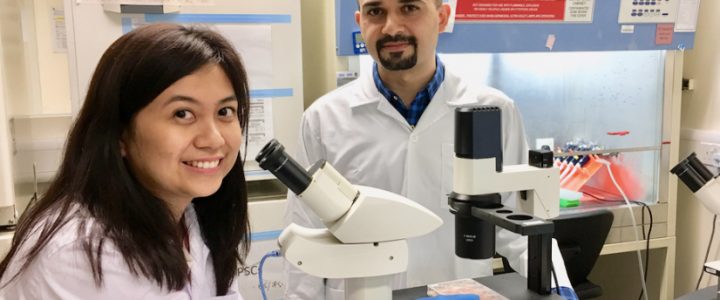
Drs. Mahmoud Pouladi and Kagistia Utami at the Agency for Science, Technology and Research (A*STAR) in Singapore were awarded a $67,500 research grant from FRAXA Research Foundation and that led to much greater governmental funding to expand this work. Their goal is to reactivate the gene which is silenced in people who have Fragile X syndrome.
Read moreClinical Trial of Metformin for Fragile X Syndrome

Metformin is commonly prescribed to control high blood sugar in type 2 diabetes. With a $50,000 grant from FRAXA Research Foundation, Dr. Artuela Çaku and Dr. Francois LePage are conducting an open-label clinical trial of metformin for children and adults with Fragile X syndrome, at the University of Sherbrooke in Canada.
Read moreReintroducing FMRP via Tat to Reduce Symptoms of Fragile X Syndrome
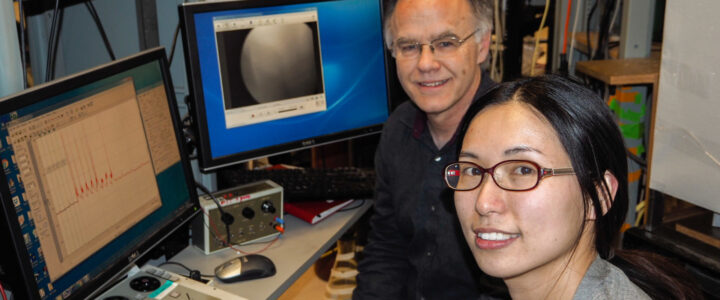
FRAXA Research Foundation and the Fragile X Research Foundation of Canada awarded a grant of $100,000 over two years to Dr. Raymond Turner at the University of Calgary in Alberta, Canada. Dr. Turner and postdoctoral fellow Xiaoqin Zhan, PhD are attempting to reactivate a segment of FMRP to reverse symptoms of Fragile X in a mouse model of the disease to reduce abnormal behaviors.
Read moreEnhancing NMDA Receptor Signaling to Treat Fragile X Syndrome

Dr. Stephanie Barnes investigated the role of NMDA receptors as a FRAXA Postdoctoral Fellow in Dr. Emily Osterweil’s laboratory at the University of Edinburgh from 2016-2018. With an additional year grant from FRAXA, she then continued her work to identify novel targets and test pharmacological therapies in the Fragile X mouse model at the Picower Institute at MIT with Dr. Mark Bear. Results published.
Read moreScreening 2,320 FDA-Approved Drugs for Potential Treatment of Fragile X

FRAXA Research Foundation has awarded a $90,000 grant to Principal Investigator Dr. Sean McBride and Postdoctoral Fellow Dr. Karen Joyce, at Rowan University, to screen all 2,320 FDA-approved drugs on both mouse and fly models of Fragile X syndrome. Those drugs which show promise will be tested in more detail for potential to treat Fragile X in humans.
Read moreCoffee, Tea, and Chocolate: Adenosine Receptors in Fragile X

Caffeine is the most popular smart drug in the world. With a $90,000 grant from FRAXA Research Foundation, Alberto Martire, PhD and Antonella Borreca, PhD in Rome, Italy are investigating adenosine receptors antagonists to treat Fragile X syndrome. Compounds which are able to block adenosine receptors are commonly found in tea, chocolate, and coffee.
Read moreFinding Fragile X Biomarkers – From Transcriptomics to Behavior in Patients

With this $20,000 award from FRAXA Research Foundation, Dr. Vanderklish and collaborators at Scripps Research Institute, the University of Chile, and the FLENI Institute in Argentina are analyzing patterns in gene expression in blood cells of patients with Fragile X syndrome. They are using “transcriptomics” which can produce a time-sensitive signature of an individual person. This is the first time that all these different levels of study – from transcriptomics to behavior – have been done for individual patients with Fragile X.
Read moreResearch Points to Drugs which Inhibit PDE to Treat Fragile X

FRAXA Research Foundation funded a grant of $90,000 over 2016-2018, for a postdoctoral fellowship for Thomas Maurin, PhD, working under the mentorship of Dr. Barbara Bardoni at INSERM in France. The team works on the biochemistry of the Fragile X protein. They have found that PDE inhibitors (a class of drugs) show promise as treatments for Fragile X syndrome. In related research, FRAXA is currently funding a clinical trial of PDE4D inhibitors.
Read moreMetformin and Aberrant Insulin Signaling in a Fragile X Mouse Model
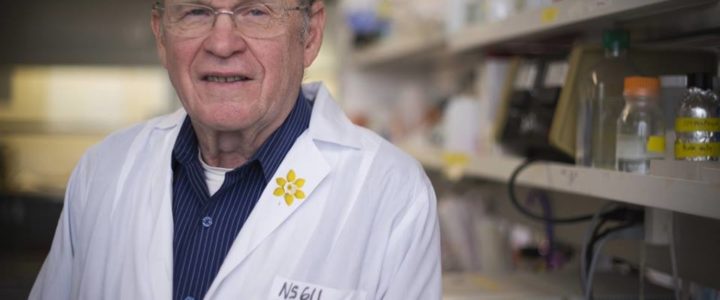
This 2017-2018 grant of $90,000 is funded jointly by FRAXA and the Fragile X Research Foundation of Canada for the first year. A previous FRAXA grant to the Sonenberg lab has led to great interest in the available drug, metformin, as a potential treatment for Fragile X syndrome. FRAXA is currently organizing clinical trials of metformin.
Read moreNon-Invasive Imaging as a Biomarker for Fragile X Clinical Trials
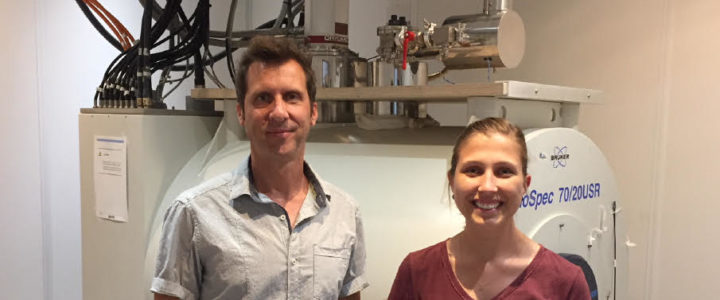
FRAXA Research Foundation has renewed Kamila Castro’s 2017 FRAXA Fellowship for a second year. With this $90,000 award, Kamila Castro and Principal Investigator Dr. Andreas Frick are using non-invasive magnetic resonance imaging (MRI) methodology to assess connectivity changes in the brain in Fragile X. If this project is successful, we will have objective outcome measures to evaluate new treatments, both in mice bred to mimic Fragile X and in human patients.
Read moreActivity-Dependent Translational Profiling in Fragile X Neurons

FRAXA’s first-ever grant to researchers at the University of California at Berkeley goes to Dr. Nicholas Ingolia and Dr. J. Wren Kim to analyze the proteomics of Fragile X neurons using a newly developed tool which can distinguish the profiles of neurons that are actively responding to signals.
Read moreUnderstanding and Reversing Hypersensitivity to Sounds in Fragile X Syndrome
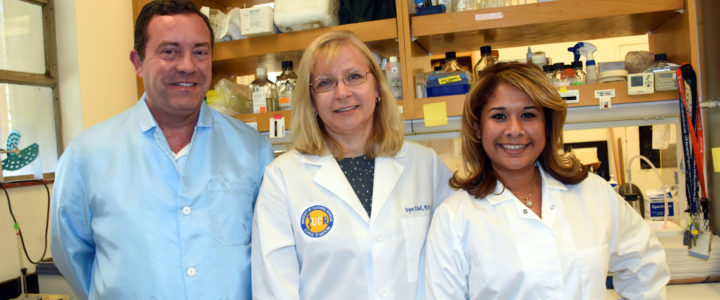
With a $90,000 grant from FRAXA Research Foundation over 2018-2019, Drs. Devin Binder, Iryna Ethell, and Patricia Pirbhoy at the University of California at Riverside aim to understand – and reverse – hypersensitivity to sound in Fragile X syndrome.
Read moreThree-Dimensional Model for Identifying Fragile X Treatments

With a $90,000 grant from FRAXA Research Foundation awarded in 2018, Dr. Peng Jin and Dr. Juhnee Kang at Emory University will develop and analyze Fragile X brain organoids to understand the disorder and identify treatment targets.
Read morePharmacological Tolerance in the Treatment of Fragile X Syndrome
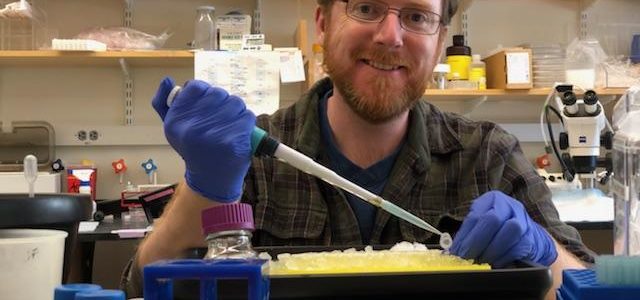
With a $90,000 grant from FRAXA Research Foundation over 2018-2019, Dr. Patrick McCamphill, postdoctoral fellow in Dr. Mark Bear’s lab at Massachusetts Institute of Technology (MIT), is investigating drug tolerance to mGluR5 antagonists, arbaclofen, and other potential Fragile X treatments. He is also exploring ways to overcome it.
Read moreRepurposing Study II: Evaluating Combinations of Drugs to Treat Fragile X

FRAXA Research Foundation initially partnered with Healx in 2016 to identify existing drugs with potential to treat Fragile X syndrome, using machine learning algorithms and computational biology. The study produced results, and now FRAXA and Healx have launched a new round of studies to evaluate combinations of compounds, including both drugs and natural products.
Read moreFragile X Clinical Trial of AZD7325 in Adults

With a $51,000 grant from FRAXA Research Foundation, Dr. Craig Erickson conducting a double-blind, placebo-controlled clinical trial of AZD7325 in adults ages 18-50 with Fragile X syndrome at Cincinnati Children’s Hospital. The compound being studied is an investigational new drug from AstraZeneca that targets GABA (A) receptors.
Read moreMicroRNA Mediated Astroglial GLT1 Dysregulation in Fragile X

Almost all brain research focuses on neurons – nerve cells. However, the brain has many more glial cells which support, nourish, and protect the neurons. FRAXA Research Foundation awarded a 2017 grant $90,000 to support Dr. Yang’s studies of how changes in glial cells contribute to Fragile X syndrome. This grant is funded by a grant from the Pierce Family Fragile X Foundation.
Read moreAutophagy is a Novel Therapeutic Target of Impaired Cognition in Fragile X Syndrome

Dr. Suzanne Zukin, at Albert Einstein College of Medicine, is expert on signaling pathways in the brain and the regulation of synaptic plasticity. With this 2017 grant of $90,000 from FRAXA Research Foundation, she and her team are exploring autophagy, which is how cells clean house, in Fragile X.
Read moreQuantitative Assessment of the Serotonin System in a Mouse Model of Fragile X Syndrome
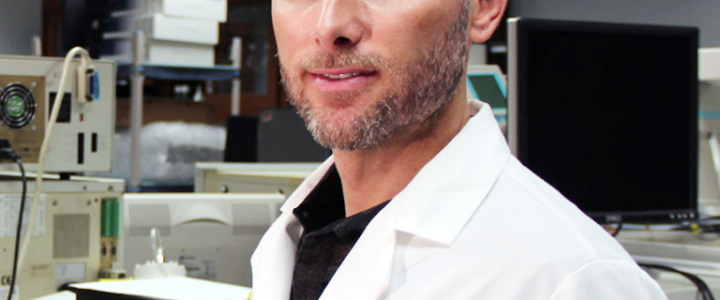
FRAXA Research Foundation awarded a grant of $90,000 over two years to Clinton Canal, PhD. Dr. Canal, previously a research assistant professor at Northeastern University, has just launched his own lab at Mercer University in Atlanta, GA, to focus on Fragile X research.
Read moreInvestigating Gene Reactivation to Treat Fragile X Syndrome

With a $180,000 grant from FRAXA Research Foundation from 2016-2017, Dr. Jeannie Lee and her team at Harvard are working to reactivate the gene that is silenced in Fragile X syndrome.
Read more
